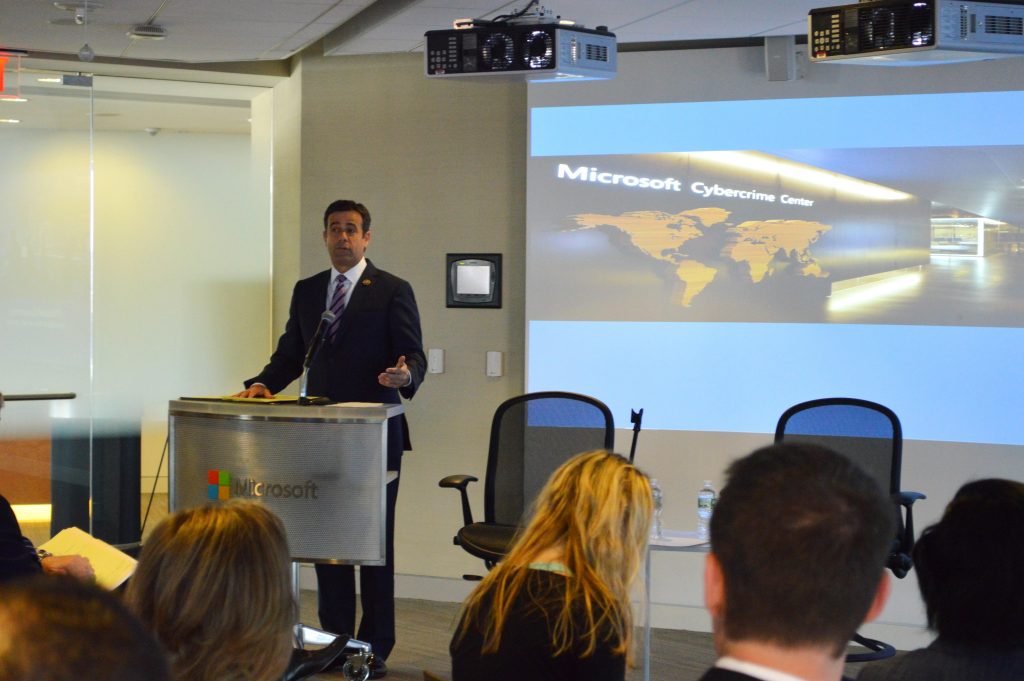Cybercrime is an issue that affects every American. There are nearly 400 million victims of cybercrime each year and cyberattacks cost our global economy $3 trillion in productivity and growth, with the average data breach costing companies an average of $3.5 million. These staggering statistics make it clear that cybersecurity has become a CEO-level issue – an issue that’s costing our country valuable resources and intellectual property while simultaneously threatening our safety and national security. As cyber threats continue to grow and evolve, public-private partnerships are increasingly essential; there is no one country, business or organization that can tackle cybercrime threats alone.
On May 14, the Microsoft Innovation & Policy Center in Washington, D.C. hosted a discussion, “Partnerships & Policies to Fight Cybercrime.” The event convened decision makers, law enforcement officials and industry experts to discuss how private sector and government collaborations have been successful in disrupting cybercriminal activities, as well as the opportunities to further enhance efforts through cybersecurity policy advancements.
Rep. John Ratcliffe of Texas, opened the conversation with remarks on the importance of cybersecurity, emphasizing that partnerships are critical in pinpointing the “who” and “why” of cyberattacks. In partnership with House Homeland Security Committee Chairman Rep. Michael McCaul of Texas, Ratcliffe recently introduced the National Cybersecurity Protection Advancement Act to advance information-sharing capabilities and further the industry-government partnership necessary to counter the growing global cyber threat.

To further illustrate the need for this collaboration, Microsoft’s Patti Chrzan, senior director of the Digital Crimes Unit (DCU), gave a keynote address demonstrating localized cyber threats. Chrzan’s presentation highlighted the innovative work that Microsoft DCU is doing to combat issues of cybercrime at home and abroad. To raise awareness of threats, Microsoft recently released the latest Security Intelligence Report, which analyzes the threat landscape of exploits, vulnerabilities and malware using data from Internet services and more than 600 million computers worldwide. Following the remarks, former Washington State Attorney General Rob McKenna moderated an informative panel discussion featuring Chrzan along with Cheri McGuire, vice president, Global Government Affairs & Cybersecurity Policy at Symantec, and James Trainor, acting assistant director of the FBI’s Cyber Division.

Cybersecurity experts agreed that forging successful public-private partnerships is vital for the efficient and effective takedown of cybercriminals. Successful partnerships in coordination with the advancement of cybersecurity policy efforts are the best avenue for fighting cybercrime and protecting Americans.
An example of a public-private partnership at work, Microsoft’s DCU combines big data analysis, cutting-edge forensics, partnerships and the law to keep customers and people safe online from cybercrime. To read more about Microsoft’s new headquarters fighting cybercrime, read Jennifer Warnick’s article on Digital Detectives.
Each month, the Microsoft Innovation & Policy Center in Washington, D.C. hosts the @Microsoft series, featuring panel discussions with members of Congress, administration officials and leading experts on a wide range of topics. The events are free, open to the public and present an opportunity to engage in policy debates with thought leaders at the highest levels of government. To learn more about this and other events, please follow @MicrosoftIPC on Twitter or visit the Innovation & Policy Center’s Facebook page.
